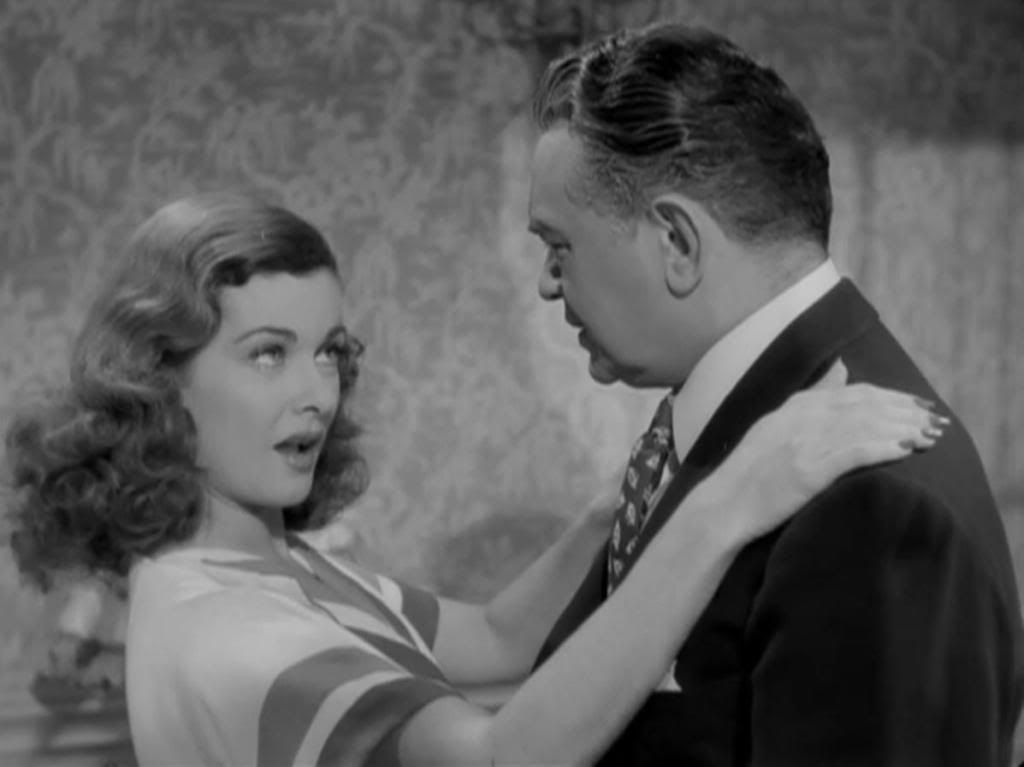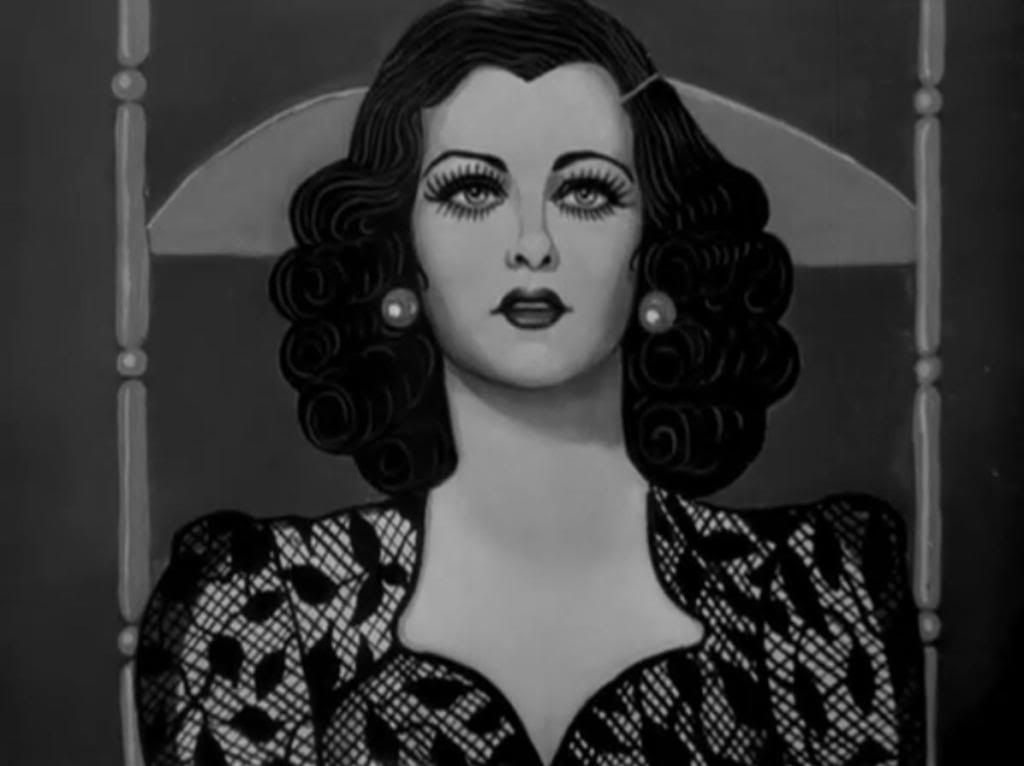
Fritz Lang followed The Woman in the Window by reuniting the same cast — Edward G. Robinson, Joan Bennett and Dan Duryea — for a second noir, Scarlet Street, a remake of Jean Renoir's classic La Chienne. This second collaboration with these actors is, if anything, even better than the first, presenting another shadowy fable of a man's downfall at the hands of a woman. Chris (Robinson) is a middle-aged cashier and Sunday painter who's given up on any hope of real happiness until he meets Kitty (Bennett), who thinks he's a successful painter and latches onto him at the urging of her leech of a boyfriend, Johnny (Duryea). This is a triangle of misplaced feelings: Chris loves Kitty, while she pines for Johnny, who seems happier when he's punching her than when he's kissing her. They're a perfect couple, in a way, because he's a sadist and she's a masochist, only attracted to a brutish man like Johnny; she can't stomach Chris' kisses, and says she'd like him better if he was crueler to her.
Bennett's Kitty is a traditional femme fatale in comparison to the more innocent character she played in Woman in the Window; whereas in that film she led Robinson's hapless protagonist to his doom without even meaning to, as though she couldn't help it, in Scarlet Street she's a knowing seductress, even if she has to be prodded into it by Johnny. She projects sex and danger from the first moment she appears on the screen, a see-through raincoat clinging to her body, a sly smirk on her face as she introduces herself with a playful bounce in her voice: "call me Kitty." She's a tough girl, casually sexy, even when she gets a drink with Chris and talks to him with a straw dangling from between her lips. When Johnny accuses her of being obsessed with sex, she immediately spits back, her voice deep and sincere, "what else is there to think about?"
In contrast, Chris is repressed and oppressed, unhappily married to a shrew (Rosalind Ivan) who he's never loved, who he married only out of a sense of desperate loneliness. When he's arguing with his wife about his paintings, he tells her, "I never saw a woman without any clothes," to which she huffily responds, "I should hope not," a perfect encapsulation of their sexless, miserable marriage. The film is full of moments like this; Dudley Nichols' screenplay crackles with clever dialogue and charged exchanges in which sex and violence are hidden within every line. The film is drenched in sex, its tension arising from the friction between the simmering repression of Chris and the over-ripe sensuality of Kitty. He asks to paint her and instead she reclines on the bed and sticks out her leg at him, stretching her foot out and telling him to paint her nails: "they'll be masterpieces." In another scene, Johnny wakes up after a drunken night and looks around the room, the camera panning over the scattered clothes and possessions of Kitty, strewn across the floor, the woman herself stepping out of an adjacent room in lingerie and an open robe.

That naughty undercurrent of sexual abandon is juxtaposed with the constant threat of violence and murder. In one darkly funny scene, Chris casually reads his wife a newspaper story about a man killing his wife, recounting the details with obvious relish, and when he adds that nobody ever gets away with it, he seems genuinely regretful. He's constantly insinuating that he's going to kill her, and in one scene she bursts in on him, yelling at him as usual, while he's carving meat. He has on an apron — a symbol, as it would be again in Nicholas Ray's later Rebel Without a Cause, of submission and emasculation — and he's holding a knife, almost reflexively pointing it towards his wife as she comes in, walking towards her with it pointed threateningly and unconsciously in her direction.
Robinson and Bennett both deliver visceral, powerful performances, and Robinson especially is fantastic as this weak-willed man who finally sees an opportunity for happiness and pleasure in his miserable life, and grabs desperately and clumsily for it. Lang examines this dark comedy of exploitation and manipulation with a rigorous, cynical eye, his camera slowly tracking in and out, catching glimpses of the characters divided, from each other and within themselves, in segmented mirrors.
The ending is especially great, as Lang abandons most of the darkly comic class subtext from Renoir's La Chienne in favor of a bleak, ironic ending that seems like a deliberate subversion of the Hays Code's ideas about crime, punishment and morality. Lang hints at a traditional Hays-era moralist reversal at the last minute, having a newspaper reporter step in to deliver a preachy monologue about how nobody gets away with murder, not really. But this doesn't lead to justice being done or order being restored, but to something even darker and more tragic, a suggestion that getting away with murder may be the worst punishment of all. The haunting final shot shows Chris walking down a snowy Christmas-time street, the crowds around him fading away until he's all alone, isolated and abandoned, plodding hopelessly away into the night, haunted by the memories of what he's done and by the illusory happiness he'd once felt before it was so violently fractured.

6 comments:
I love [i]La Chienne[/i] but Lang's dark haunting ending resonates with me more. I also love the way he uses diegetic sounds/music to such great effect.. the organ grinder, radio sounds and in particular, the use of 'Melancholy Baby'.
In my case I haven't seen Renoir's film. But Lang delivers one of the great noirs with his brilliant cast. As you mentioned the ending is great! Seing more Lang films is one of my goals for this year. I saw M and Metropolis many years ago and Dr. Mabuse. When I think about his Hollywoodian career Scarlet Street is the only one I've ever seen and I still have a great impression of this picture. I'll have to get to more Lang sooner.
I love that finale too.
And now I expect you'll move on to Lang's orher U.S. Renoir remake, Human Desire, right?
I probably prefer La Chienne somewhat for having more dark humor, but Lang's version is great too. It's a good example of two masters approaching the same material from slightly different angles and both producing masterpieces.
Good point about the sound design, Charulata. Michaël, I've got lots more Lang to see, too. Make The Big Heat a priority, for sure!
David, I haven't seen Human Desire yet but I definitely want to get to that other Renoir/Lang pairing sometime soon.
"That naughty undercurrent of sexual abandon is juxtaposed with the constant threat of violence and murder. In one darkly funny scene, Chris casually reads his wife a newspaper story about a man killing his wife, recounting the details with obvious relish, and when he adds that nobody ever gets away with it, he seems genuinely regretful."
Yes indeed, excellent and vital point. Like some others here I also prefer LA CHIENNE, though by most barometers of measurement this film ranks among Lang's finest American films and a work that is often referred to as one of the darkest film noirs. Robinson, likewise gives one of this most electrifying turns and the end is powerful stuff.
Another exceptionally observant essay on an essential film.
Yup, one of the great noirs even if it doesn't quite reach the heights of Renoir's original. Robinson is a perfect focus for the film's mix of pathos and cynicism.
Post a Comment